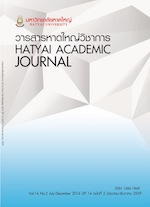สมรรถนะการบริหารความขัดแย้ง สำหรับผู้บริหารสถานศึกษา สังกัดสำนักงาน คณะกรรมการการศึกษาขั้นพื้นฐาน ในจังหวัดชายแดนภาคใต้
Main Article Content
Abstract
Conflict Management Competency for School Administrators under the Office of Basic Education Commission in the Southernmost Provinces
The purpose of this research was to study administrators’ competency in conflict management for their schools under the supervision of the Office of Basic Education Commission in the Southernmost Provinces. There was total of 862 samples. Administrators and basic education committees of schools located in Pattani, Yala, Narathiwat, Satun and four districts of Songkhla province were selected by Stratified Random Sampling and Simple Random methods. Data collected by survey questionnaires were statistically analyzed through the methods of content analysis, frequency, percentage, average, standard deviation, cluster analysis, and exploratory factor analysis. The results revealed that the components of the schools’ administrators’ conflict management consisted of six competencies in: 1) controlling and solving conflicts, 2) confronting conflicts with superior leadership skills, 3) building relationships and equalities, 4) managing an organization’s balancing of conflicts, 5) respecting cultural diversities, and 6) self-control in encountering conflict situations.
Article Details
All submitted articles are subject to academic validation by qualified experts (peer review). The opinions expressed in each article of this publication are those of the authors themselves. The editorial board holds no responsibilities on them and does not reserve the copyright for academic use with the condition that the reference of their origin is cited.
